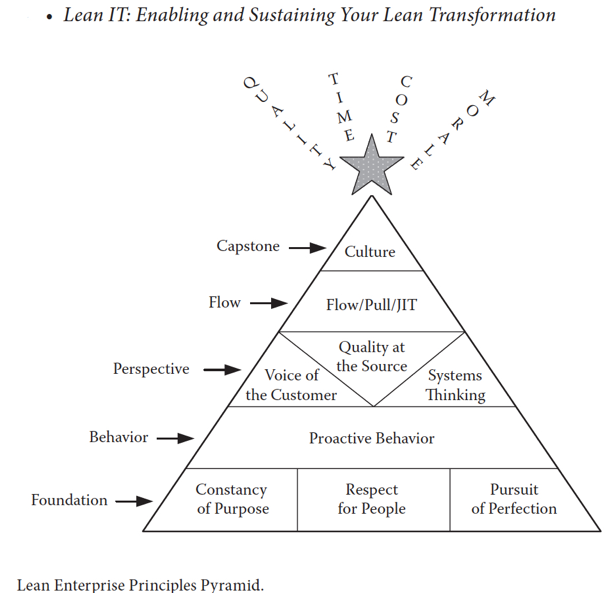In my last post, The Power of a Game: What I Learned from Facilitating the Phoenix Project Simulation, we explored how DevOps and Agile practices are built on underlying Lean principles that go back decades to a time before the Toyota Production System. When you look into the history of Lean, it is almost impossible not to encounter the great thinker Shigeo Shingo. Shingo worked closely with Taiichi Ohno(the father of the Toyota Production System) to advance Lean thinking while building the lean production system at Toyota.
As someone who attempted to apply Lean to IT long before DevOps came into existence, I have always said that DevOps is about creating an environment where it is safe to look deeply, question what is happening, think crazy things, experiment, and learn based on outcomes. Ten years ago, I was invited by The Shingo Instituteto serve as a teacher, coach and assessor. I had recently been awarded the Shingo prize for my book, Lean IT – Enabling and Sustaining Your Lean Transformation. What I learned from Shigeo Shingo’s writings heavily deepened my understanding of the role of Lean and flowin IT. These ideas are reflected in the Lean Enterprise Pyramid below and it’s amazing how effective they are with Agile and DevOps.
Principles & IT Excellence
A principle is a timeless universal truth that controls outcomes whether you believe in it or now. Think of it as a fundamental truth or proposition that serves as the foundation for a system of beliefs and behaviors. Principles govern consequences and outcomes – both positive and negative. “Create customer value” is a core principle in business success. If you don’t believe in customer value, or don’t deliver it, your prognosis is pretty bleak.
In Lean IT, I introduced some key principles that drive IT success (see the Principle Pyramid image).
Let’s begin with a working definition of DevOps – a mindset, tool set, and set of practices that combine software development and IT operations to shorten the development/operations life cycle to deliver small iterative features, fixes, and updates often and in close alignment with business objectives and value creation.
Consider the lean principles pyramid from a DevOps perspective :
- Foundation principles build an intentional culture of trust, respect, focus and learning
- Behavior ishow we show up and engage
- Perspective is a fresh new way of looking at IT work
- Flow is the outcome of effective DevOps in action
- Capstone of the pyramid fosters a regenerative culture of trust, safety, experimentation, collaboration and innovation
- Outcomes are higher quality IT solutions and services, in less time, with less cost with healthier teams!
For DevOps, Agile and High-Velocity IT of any flavor to be successful, each of these principles must be addressed. You can’t address them all at once, so I suggest beginning at the base while taking steps to enhance flow. If you focus on these two elements, respect for people and flow, you will always be progressing in the right direction!
Systems & IT Excellence
Shingo defined a system as a collection of tools and tasks that are highly integrated to accomplish a specific outcome. The Shingo Model captures the important relationship between principles, systems, tools and results. It also supports three key insights which clarify how to achieve excellence in IT (or any organization). IT needs to get good and then continuously get better with its systems, tools and results (no kidding!). Understanding how these elements are informed and reinforced by principles is essential to making this happen.
The insights:
- Ideal Results Require Ideal Behavior
- Beliefs and Systems Drive Behavior
- Principles Inform Ideal Behavior
For DevOps & Agile, the Shingo Model provides a logical sequence for change. Put another way, what are the key questions we need to answer?
- What do the ideal behaviors of DevOps look like?
- A) What beliefs do our people have today and what beliefs do they need to embrace DevOps? B) What systems (think: work systems, procedures, policies and technology) do we have in place today, what behaviors do they drive and what needs to change?
- How can our understanding of lean principles clarify our understanding of question #1?
Take a moment and reflect on the role of principles and systems in your transformation. The more you ground your approach in the stability of principles, the greater your chances of success. If you or your organization does not truly believe in these principles, a conversation around which principles you do believe in would be a good place to start.
Please let me know if this is helpful and what obstacles you encounter.
Michael Orzen has been serving as a Lean coach and guide in the IT space for over 25 years. His passion for hi-velocity IT, respect for people, mindfulness and continuous learning have made him a highly sought adviser and coach to many IT leaders. He lives in Portland, Oregon and can be reached at mike@mikeorzen.com.
